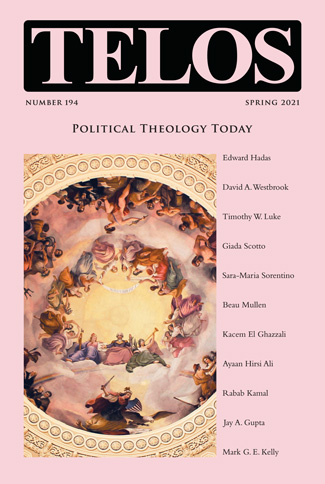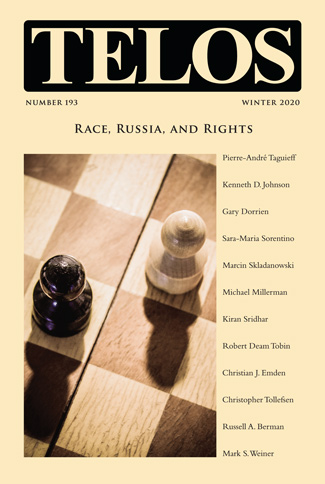By David Pan · Monday, August 8, 2022 Dear Telos readers,
I’m excited to invite you to attend a special event at the John D. Calandra Italian American Institute in New York City on October 14–15, 2022, to celebrate the 200th issue of Telos, which will be appearing in Fall 2022. You can register for the event at the Telos-Paul Piccone Institute website, at www.telosinstitute.net/telos200. The event will take place from 3 pm to 6 pm on October 14 and from 9 am to 5 pm on October 15. The admission is $100 for both days and includes a reception on October 14 and lunch on October 15.
The event will feature Joel Kotkin (author of The New Class Conflict) and Michael Lind (author of The New Class War: Saving Democracy from the Managerial Elite) as keynote speakers, who will discuss the new politics of class.
Continue reading →
By Russell A. Berman · Monday, August 8, 2022 The following comments refer to Mathieu Slama’s “How Brilliant Scientists Damage Democracy,” which appears here.
Among the many features of the COVID crisis, one stands out as particularly consequential: the attribution of ultimate and exclusive authority to science. Public statements abounded urging that we “follow the science,” and signs popped up on front lawns across the country advertising that the residents “believe in science”—as if science were a matter of belief rather than skepticism, observation, and experimentation. There was of course little attention to alternative scientific claims or debates within science. Instead of a scientific event, we witnessed the assertion of authority by way of the invocation of science or of what came to pass as “science.” The mandate to “follow the science” blindly has come to mean “follow the leader,” with no questions asked.
For large swaths of the public, the scientific label carries with it the implication of veracity: science, as opposed to religion (which is otherwise the proper subject matter of belief), is truth. Indeed the equation is a formula for modernity, which is why bizarre variants of modernization repeatedly cast themselves in the role of science: for Communism, the “science of Marxism-Leninism,” and for Nazis, “race science.” Nor do we have to look that far afield to those extreme cases in order to find reason to question the absolute truth claim of science. One can point to scandals like the Tuskegee experiment and to the regular reports of fraud and retractions, even in the most prestigious scientific journals. Just recently one reads that research reported in the journal Nature concerning Alzheimer’s may have been fraudulent. Following that science probably wasted millions of research dollars.
Continue reading →
By Mathieu Slama · Monday, August 8, 2022 These remarks on the French Science Council were published in Le Figaro on July 7, 2022 and appear here with permission of the author. Translated by Russell A. Berman, whose comments are here.
The Science Council met for the last time this week and has issued its 75th and final opinion. It will disappear officially on July 31. In its final statement, it underscored the importance of better scientific education for the youth, who will be the public leaders of the future, and it recommended the creation of a “Council of Science,” which would consist of a “group of scientists of the highest quality” to advise the head of state. Whether these recommendations are followed or not, it is likely that some new organ will be established in the coming months. In any case, we are at the end of an institution that played a decisive role throughout the public health crisis, and it is useful to offer a preliminary evaluation of it.
Composed of brilliant individuals and our best scientists, the Science Council—despite all the talent that it has included—has been one of the principal architects of the democratic debacle of the health crisis. And if there is a lesson to be drawn from this fiasco, it is that science should never be a substitute for politics and that political decisions cannot result simply from scientific expertise—at the risk of profoundly degrading our democracy.
Continue reading →
By David Pan · Monday, August 1, 2022  Concerns about inflation can lead us to exaggerate the role of money in the economy. In his essay on “Three Rival Versions of Monetary Enquiry,” in Telos 194, Edward Hadas argues that money is not at the center of economics. Instead, economics is fundamentally about what he calls the “Great Exchange,” in which people offer labor that changes the world and the world in return provides gifts to people in the form of goods and services. At its basis, this exchange involves the relationship between humans and nature, as well as the ways in which humans decide to manage this relationship. Though it can go on with or without money, money is very useful for managing the individual elements of the Great Exchange. As the mediator of the details of the Great Exchange, money is in fact neutral, neither a nefarious underminer of human relations nor a key to prosperity. Concerns about inflation can lead us to exaggerate the role of money in the economy. In his essay on “Three Rival Versions of Monetary Enquiry,” in Telos 194, Edward Hadas argues that money is not at the center of economics. Instead, economics is fundamentally about what he calls the “Great Exchange,” in which people offer labor that changes the world and the world in return provides gifts to people in the form of goods and services. At its basis, this exchange involves the relationship between humans and nature, as well as the ways in which humans decide to manage this relationship. Though it can go on with or without money, money is very useful for managing the individual elements of the Great Exchange. As the mediator of the details of the Great Exchange, money is in fact neutral, neither a nefarious underminer of human relations nor a key to prosperity.
Continue reading →
By Telos Press · Monday, July 25, 2022 In today’s episode of the Telos Press Podcast, David Pan talks with Mark G.E. Kelly and Timothy W. Luke about the Russian invasion of Ukraine and its consequences for world order. Our current issue, Telos 199 (Summer 2022), features essays by Luke, Kelly, and Pan on the war in Ukraine, excerpts of which appear here. Click through to read the full articles at the Telos Online website (subscription required). To learn how your university can subscribe to Telos, visit our library recommendation page. Print copies of Telos 199 are also available for purchase in our online store.
Continue reading →
By David Pan · Monday, July 18, 2022  The extended nature of the war in Ukraine stems from the long-term political and ideological developments that have led up to it and will continue to dominate it. In Russia, the government has maintained support for the war through the promotion of a civilizational narrative about Russian culture that has been established over the last twenty years. As Marcin Skladanowski describes in “Criticism of Western Liberal Democracy by Patriarch Kirill of Moscow and All Rus'” (Telos 193), the Russian Orthodox Church has set up the conflict between Russia and the West as a moral one, in which Russia defends a divinely grounded morality against the amoral secularism of the West. This religiously grounded idea of a civilizational conflict exists alongside a philosophical explanation. In “The Ethnosociological and Existential Dimensions of Alexander Dugin’s Populism” (Telos 193), Michael Millerman describes Dugin’s Heideggerian attempt to establish civilizational differences between peoples as the basis for an anthropological theory of human existence. As Nikolai-Klaus von Kreitor recounts in “Elements of the New Russian Nationalism” (Telos 96), Dugin was already at work in the early 1990s on such ideas when he developed Carl Schmitt’s theory of the Grossraum in order to criticize U.S. imperialism and justify a Eurasian regional hegemony to counter the dominance of the Western liberal order. The extended nature of the war in Ukraine stems from the long-term political and ideological developments that have led up to it and will continue to dominate it. In Russia, the government has maintained support for the war through the promotion of a civilizational narrative about Russian culture that has been established over the last twenty years. As Marcin Skladanowski describes in “Criticism of Western Liberal Democracy by Patriarch Kirill of Moscow and All Rus'” (Telos 193), the Russian Orthodox Church has set up the conflict between Russia and the West as a moral one, in which Russia defends a divinely grounded morality against the amoral secularism of the West. This religiously grounded idea of a civilizational conflict exists alongside a philosophical explanation. In “The Ethnosociological and Existential Dimensions of Alexander Dugin’s Populism” (Telos 193), Michael Millerman describes Dugin’s Heideggerian attempt to establish civilizational differences between peoples as the basis for an anthropological theory of human existence. As Nikolai-Klaus von Kreitor recounts in “Elements of the New Russian Nationalism” (Telos 96), Dugin was already at work in the early 1990s on such ideas when he developed Carl Schmitt’s theory of the Grossraum in order to criticize U.S. imperialism and justify a Eurasian regional hegemony to counter the dominance of the Western liberal order.
Continue reading →
|
|




